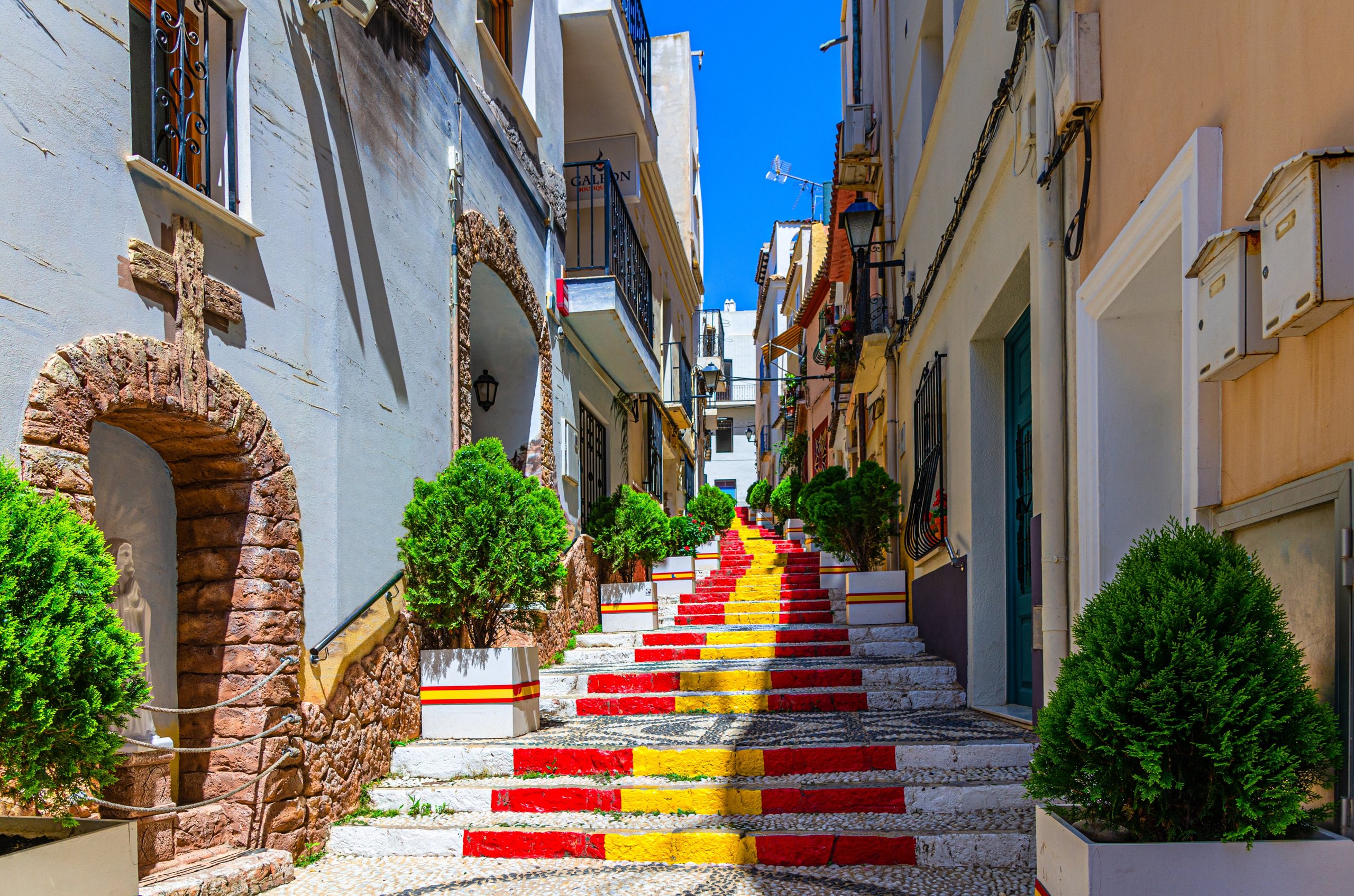Buying a home in Spain is a dream shared by many, but costs can quickly spiral if you don’t know where to look for savings. From legal fees to currency exchange, here’s how you can buy smart and cut costs without cutting corners – all while still getting the home you really want.
Whether you’re buying a holiday home, planning a permanent move overseas or investing in Spanish property, sticking to your budget is likely a top priority. But with a different legal system, currency and way of doing things, it’s all too easy to spend more than you need to. In this guide, we’ll help you make smart decisions and save money at every stage of the buying process.
Download the Spain Buying Guide
Contents
Understand your taxes and legal fees
You can’t avoid the additional costs of buying a property in Spain, but you can control them. Expect to pay around 10-15% on top of the purchase price to cover fees and taxes. Knowing what they are – and where there’s wiggle room – could mean real savings.
| Fee type | Typical cost | Can you save? |
|---|---|---|
| Property transfer tax (ITP) or VAT (new builds) | 6-10% depending on region | Yes – choose a region with lower ITP |
| Legal fees | 1-2% | Yes – shop around and get recommendations |
| Notary, title deed, land registry | 1-2.5% | Not really – these are state-set |
Property transfer tax (ITP) varies significantly across Spain’s 17 autonomous communities. For example, Madrid charges 6%, while Valencia’s rate is 10%. Choosing a location with a lower rate could save you thousands – without compromising on lifestyle. However, you’ll need to weigh this against property values and local demand.
When choosing a solicitor, it can be tempting to save money by going with the cheapest quote, but it’s important to check exactly what’s included. Your lawyer should specialise in Spanish property law, speak fluent English and be able to liaise with the notary, land registry and bank on your behalf. At Your Overseas Home, we work with reputable, English-speaking solicitors across Spain who can simplify the legal process and help you avoid costly delays.
Speak to a Spain property expert
Save money on the property itself
If you’re willing to compromise on location or condition, there are plenty of smart ways to buy for less. Park homes and cave houses may sound niche, but they offer low running costs, cooler temperatures in summer and surprisingly strong resale value in the right markets. In regions like Granada or Almería, you’ll find entire communities based around these alternative property types.
Buying off-plan can offer discounts of 10-20% if you purchase early in the construction cycle. Developers are often keen to secure funding in the first release phase. Just make sure to do your due diligence – confirm the builder is reputable, the land is registered and that you’ve got a bank guarantee on your deposit.
Fixer-uppers are another route to savings – especially if you can manage some of the work yourself. But be honest about your tolerance for renovation stress. Hiring a local project manager who speaks both English and Spanish can help you avoid overpaying for materials or labour.
As a general rule, properties a few kilometres inland offer significantly better value than those on the coast. You may miss out on sea views, but you’ll often gain in square footage, privacy and authenticity.
Negotiate like a local

Most Spanish property listings have some negotiation room – especially if the home has been on the market for a while. Negotiating may not come naturally to you, but when you’re dealing with the kind of sums involved in buying a property, it’s worth putting your hesitation aside and giving it a try.
The key to saving is coming prepared. Before making your offer, spend time researching similar listings in the same area. Use property portals to benchmark prices. If you can, speak to locals or visit the area in person. Chat to shop owners or neighbours to get a feel for how long the home has been for sale – they’ll often tell you more than the agent will.
The more evidence you bring to the table, the more seriously your offer will be taken. In a buyer’s market, it’s not unusual to negotiate 5-10% off the asking price. But even in a balanced market, you might still shave a few thousand euros off – enough to cover your legal fees or moving costs.
Get your timing right
Although there’s no official ‘cheap’ season for buying property in Spain, buying trends suggest that certain months offer more negotiating power. Fewer buyers in winter mean less competition – and more motivated sellers. This is particularly true from November to January, when viewings drop off and owners may be keen to close before the end of the year.
Spring can also be a fruitful time, as many British retires choose to return to the UK after winter, and may be open to quick sales. Conversely, summer is generally the busiest season, with high demand and fewer price reductions – although if a holiday rental isn’t producing expected income, you could get a bargain, even in August.
Understanding the seller’s situation can be just as powerful as timing. If the home has been inherited, if the owners are divorcing or if they’ve already bought elsewhere, they may be more open to offers. Don’t be afraid to ask your agent what they know – just take their answer with a pinch of salt.
Use currency tools to your advantage
Every buyer has a budget – but if your budget is in pounds and the property is priced in euros, fluctuations in the exchange rate can make a huge difference. A movement of just 1-2 cents in the exchange rate could cost you thousands.
Example: If you’re buying a €250,000 home, and the rate moves from €1.17/£1 to €1.12/£1, the cost jumps from £213,675 to £223,214. That’s nearly £10,000 more – just because of the exchange rate.
Currency specialists like Smart Currency Exchange offer tools such as forward contracts, where you can lock in today’s exchange rate for up to 12 months. This means you know exactly how much you’ll pay in pounds, no matter what the markets do.
They also offer rate alerts, personalised market guidance and access to better rates than most banks. Many buyers combine this with a Spanish bank account to streamline payments for ongoing bills and taxes.
Final thoughts
There are plenty of ways to save money when buying a home in Spain. With the right planning and a bit of research, you can avoid common traps and stretch your budget further than you might expect. Don’t rush, ask the right questions and lean on experts when needed. That way, you’ll not only save money – you’ll enjoy greater peace of mind throughout your Spanish buying journey.
FAQs about saving money on buying property in Spain
Buyers typically pay between 6% and 10% in property transfer tax (ITP) on resale homes, depending on the region. For new builds, you’ll pay 10% VAT (IVA) plus an additional 0.75-1.5% in stamp duty (AJD). On top of that, budget another 2-3% for legal fees, notary charges and registration costs.
Yes – for many buyers, Spain remains a smart choice. Property prices are still relatively low in many areas, and with interest rates stabilising, it’s possible to get good value. If you do your research, negotiate well and protect yourself against currency swings, now could be a very good time to buy – especially in areas with growing demand or strong rental potential.
There are exemptions available. If you’re a resident aged 65 or over and selling your main home, you may be exempt. You can also avoid capital gains tax if you reinvest the full sale proceeds in another main residence within Spain. Always seek legal advice first, as eligibility depends on residency status and how long you’ve owned and lived in the property.
You might also like:









